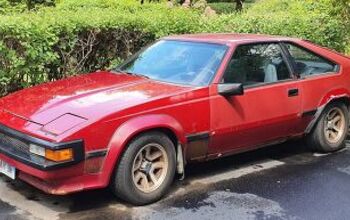Reinventing the Wheel: Daimler Intentionally Becoming a Smaller Company to Facilitate Tech

Daimler Chairman Ola Källenius went against the grain on Thursday by admitting the company he’s been tasked with overseeing will become significantly smaller in five years. That’s normally not the kind of thing you want to telegraph to shareholders via the media but he’s convinced this is the best course of action for the business.
“The next five years we will become a smaller company,” Källenius told Reuters. “We will have a fundamental change in the industrial footprint on the powertrain side.”
The future of Daimler apparently involves a half-decade metamorphosis into a services-focused software company that just so happens to build vehicles. But the vehicles won’t be those internal-combustion jobs that you grew up around. Instead, they’ll be hyper-efficient electrics from Mercedes-Benz as it re-imagines luxury within the strict confines of environmental sustainability. As a byproduct, Daimler will need fewer employees to help manufacture automobiles.
From Reuters:
Jobs will disappear because it takes less time to build an electric car than a conventional gasoline or diesel version.
That’s because an electric car’s battery and motor have only 200 components, compared with at least 1,400 parts found in a combustion engine and transmission, according to analysts at ING.
The shift away from fossil fuel requires the automaker to double down on efficiency so it can free up resources to build electric and self-driving cars, Kallenius [sic] said.
“We are hiring a lot of new software engineers, experts in battery chemistry, electrification,” he explained.
Making Daimler smaller also fits with a new era where luxury no longer defines itself through opulence and excess but also through sustainability and efficiency.
Traditional luxury is becoming passé now that Daimler knows splendor is incomparable with green movement. But its a concerning decision when we’ve yet to see any automaker other than Tesla showcase that EVs can reliably turn a profit. Even there, the American manufacturer gets a sizable financial boost from selling carbon credits to established firms with deep pockets and an inability to adhere with regulatory mandates.
Assuming governments around the world stay the course and continue doubling down on emissions fines and incentivizing EV purchases, Daimler might be on the right path. However it’s just one company of sea of manufacturers who are all attempting to do the same thing at a time when electric development programs are extremely costly and the vehicles themselves are failing to reach parity with their gas-driven ancestors at the necessary pace. What happens five years from now when there’s more direct competition in the electrified segment and the market is still dragging its feet with low adoption rates?
Källenius said this may not matter since Daimler will have an entirely different business model. Mercedes-Benz has been toying with the notion of selling fully equipped vehicles that have to have features unlocked via in-app subscription purchases (something we’re skeptical of benefiting consumers). But it thinks it can make money by implementing these changes and other digital services (customer data acquisition, new infotainment options, assisted driving packages, partnered advertising, etc.) offering recurring sources of revenue when it releases its new vehicle operating system in 2024.
“Think about it like an iPhone,” Källenius explained, noting that even more services could be added via over-the-air software updates and vehicle connectivity.
“You can add to it,” he said. “That’s the beauty of it.”
Mercedes-Benz sees China as the next growth market and will be directing most of its efforts to sell vehicles there. This may include allocating future production efforts inside the country and catering vehicles to the market’s taste.
“If we have individual models which reach a critical mass in China … that’s possible,” Källenius said, noting that production plans had not yet been finalized. “It depends on how the market develops.”
[Image: Franz12/Shutterstock]

A staunch consumer advocate tracking industry trends and regulation. Before joining TTAC, Matt spent a decade working for marketing and research firms based in NYC. Clients included several of the world’s largest automakers, global tire brands, and aftermarket part suppliers. Dissatisfied with the corporate world and resentful of having to wear suits everyday, he pivoted to writing about cars. Since then, that man has become an ardent supporter of the right-to-repair movement, been interviewed on the auto industry by national radio broadcasts, driven more rental cars than anyone ever should, participated in amateur rallying events, and received the requisite minimum training as sanctioned by the SCCA. Handy with a wrench, Matt grew up surrounded by Detroit auto workers and managed to get a pizza delivery job before he was legally eligible. He later found himself driving box trucks through Manhattan, guaranteeing future sympathy for actual truckers. He continues to conduct research pertaining to the automotive sector as an independent contractor and has since moved back to his native Michigan, closer to where the cars are born. A contrarian, Matt claims to prefer understeer — stating that front and all-wheel drive vehicles cater best to his driving style.
More by Matt Posky
Latest Car Reviews
Read moreLatest Product Reviews
Read moreRecent Comments
- Arthur Dailey The longest we have ever kept a car was 13 years for a Kia Rondo. Only ever had to perform routine 'wear and tear' maintenance. Brake jobs, tire replacements, fluids replacements (per mfg specs), battery replacement, etc. All in all it was an entirely positive ownership experience. The worst ownership experiences from oldest to newest were Ford, Chrysler and Hyundai.Neutral regarding GM, Honda, Nissan (two good, one not so good) and VW (3 good and 1 terrible). Experiences with other manufacturers were all too short to objectively comment on.
- MaintenanceCosts Two-speed transfer case and lockable differentials are essential for getting over the curb in Beverly Hills to park on the sidewalk.
- MaintenanceCosts I don't think any other OEM is dumb enough to market the system as "Full Self-Driving," and if it's presented as a competitor to SuperCruise or the like it's OK.
- Oberkanone Tesla license their skateboard platforms to other manufacturers. Great. Better yet, Tesla manufacture and sell the platforms and auto manufacturers manufacture the body and interiors. Fantastic.
- ToolGuy As of right now, Tesla is convinced that their old approach to FSD doesn't work, and that their new approach to FSD will work. I ain't saying I agree or disagree, just telling you where they are.


































Comments
Join the conversation
The title is a bit clickbaity, I think. From what I read of the press release, it looks like they aren't planning to sell less vehicles or make less money. They just mean "hey, you know those angry union assholes? Yeah we probably gonna need to pay less of them going forward."
Hey, have full with the "put all the eggs in the China basket" strategy there, guys. This will lead to tears, guaranteed.